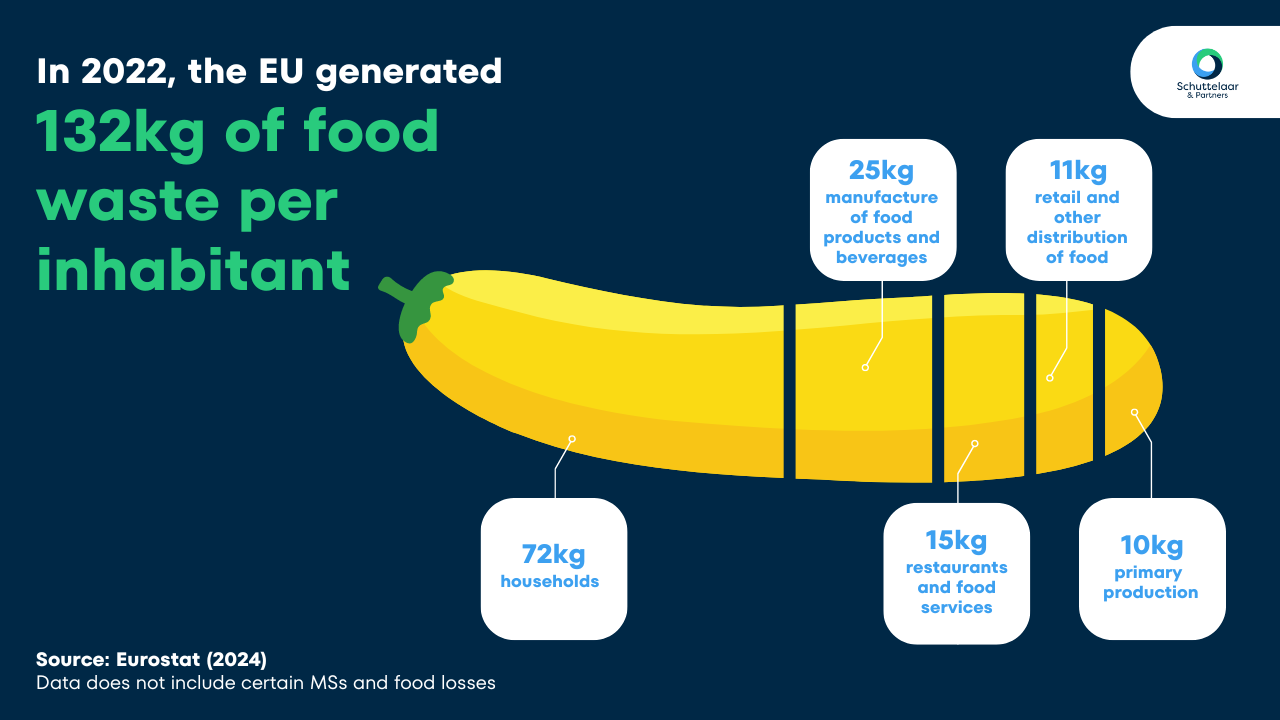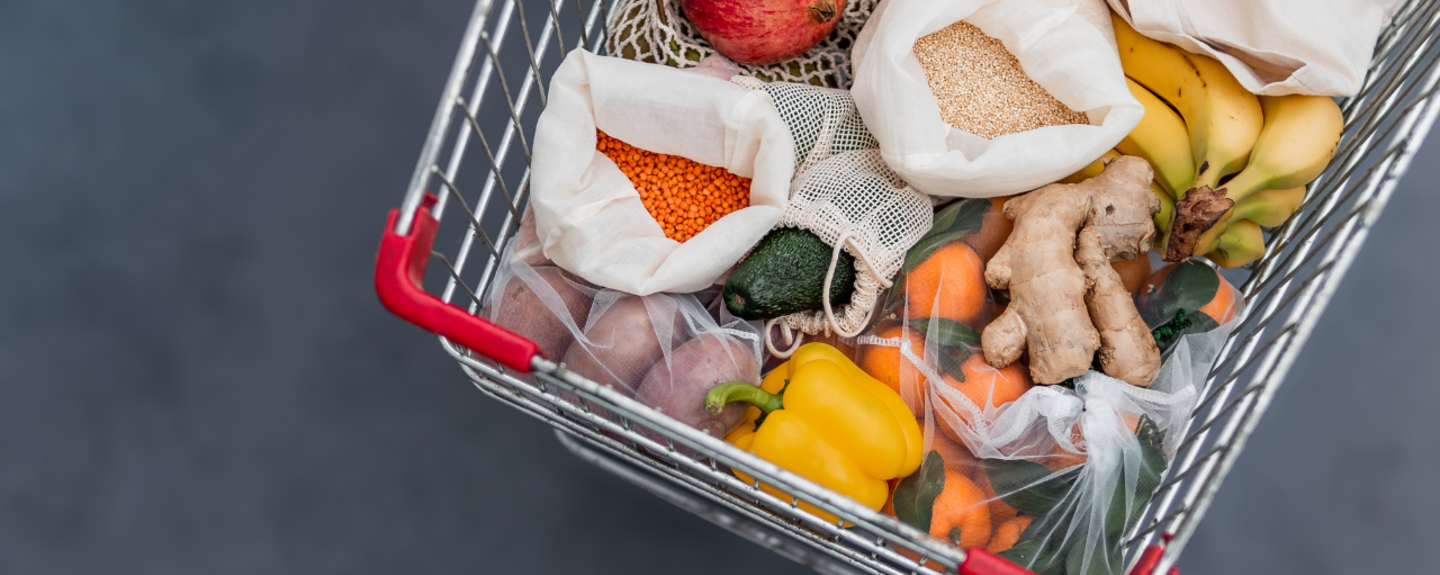International Day of Awareness of Food Loss and Waste
On 29 September, we celebrate the fifth International Day of Awareness of Food Loss and Waste. This year, the focus is on the critical need for financing to strengthen efforts to reduce food loss and waste, contribute to climate goals, and advance the 2030 Agenda for Sustainable Development. In 2022, approximately 132 kg of food waste per inhabitant was generated in the EU. Wasting food is not only an ethical and economic concern but also puts a strain on our planet's already limited natural resources.
The United Nations General Assembly designated 29 September as the International Day of Awareness of Food Loss and Waste (IDAFLW). The day is co-convened by the Food and Agriculture Organization of the United Nations (FAO) and the United Nations Environment Programme (UNEP), and the day's events are led jointly by the two organisations.
This year, the fifth observance of the IDAFLW is observed on Friday 27 September highlighting the critical need for financing to bolster efforts to reduce food loss and waste, contribute to achieving climate goals, and advance the 2030 Agenda for Sustainable Development.
The scale of the food waste problem
Globally, around 12.3% of food produced is lost between harvest and retail, while an estimated 19% of total global food production is wasted in households, in the food service, and in retail all together.
According to the latest EU data on food waste, published by the European Statistical Office today, more than 59 million tonnes of food waste - around 132 kg per inhabitant - were generated in the EU in 2022. This reflects only minor changes compared to 2021 levels, as countries continue to work on improving their measurement methodologies and revising their national data.

Households generated 54% of food waste, accounting for 72 kg per inhabitant. The remaining 46% was waste generated upwards in the food supply chain. Household food waste is slightly more than twice the amount of food waste arising from the sectors of primary production and manufacture of food products and beverages (10 kg and 25 kg per inhabitant; 8% and 19%, respectively), sectors in which strategies exist for reducing food waste, for instance with the use of discarded parts as by-products. Finally, the sectors restaurants and food services and retail and other distribution of food accounted for 15 kg and 11 kg of food waste per person (11% and 8%, respectively); however, the impact of the end of the COVID-19 lockdowns on these two sectors is still being analysed.
The world produces enough food to feed everyone, but food loss and waste reduce the amount of food available for consumption, thus contributing to food insecurity. Many of the most highly nutritious foods, such as fresh produce, fishery, and animal products are highly perishable and sustain high levels of food loss. For instance, the most wasted foods in EU households are vegetables (21.3% out of total food waste), fruits (18.3%), meat (8%), dairy (7.1%), and cereals - mainly bread and bread products (6.5%).
Why is it important to reduce food loss and waste?
Reducing food loss and waste generates benefits for economies, for businesses and consumers, for human health, and for the environment.
Food loss and waste undermine the sustainability of our food systems. When food is lost or wasted, all the resources used to produce it - including water, land, energy, labour and capital - are wasted. In addition, disposing of food loss and waste in landfills, leads to greenhouse gas emissions, contributing to climate change. Food loss and waste can also negatively impact food security and food availability and contribute to increasing the cost of food.
Our food systems cannot be resilient if they are not sustainable, which underscores the need to adopt integrated approaches designed to reduce food loss and waste. Both global and local actions are required to maximise the use of the food we produce. The introduction of technologies and innovative solutions along with new ways of working and good practices to manage food quality and reduce food loss and waste, are key to implementing transformative change.
Food loss and waste result in significant economic losses, affecting the entire food supply chain from farm to fork, as well as livelihoods and overall economic stability. Furthermore, food waste in landfills accounts for 8-10% of total agrifood system emissions, exarcebating climate change and harming environmental sustainability.
Reducing food loss and waste is a climate solution that countries and communities can employ to reduce greenhouse gas emissions. Successfully achieving this will require a significant increase in the quality and quantity of accessible climate finance.
Finally, reducing food loss and waste can also have a positive social impact in providing a healthy, nutritious diet to a growing global population. Ensuring more of the global food supply is used to feed people, rather than perishing or ending up in landfills, is an important strategy for addressing food insecurity.
With six years left to reach the Target 12.3 of the Sustainable Development Goal 12 (Responsible consumption and production), there is an urgent need to accelerate action to reduce food loss and waste.
Just released: two new initiatives from the FAO and the European Commission
Today, the FAO organised a global virtual event and launched The Food Loss and Waste Challenge, which includes interactive brainteasers, quizzes, and crosswords to put knowledge to the test. This friendly competition offers three levels of difficulty - easy, medium, and difficult - and participants can share their results on social media.
Meanwhile, the European Commission launched the campaign Zero Waste, More Taste!. The highlight of this campaign is the publication of a cookbook featuring 27 recipes created by European chefs, designed to help citizens cut waste in an easy and exciting way while preparing delicious meals. The recipe book is accompanied by ten short video reels intended for social media.
At Schuttelaar, we actively work on the topic and monitor policy developments. You can explore our work on sustainable and healthy food & nutrition here.











